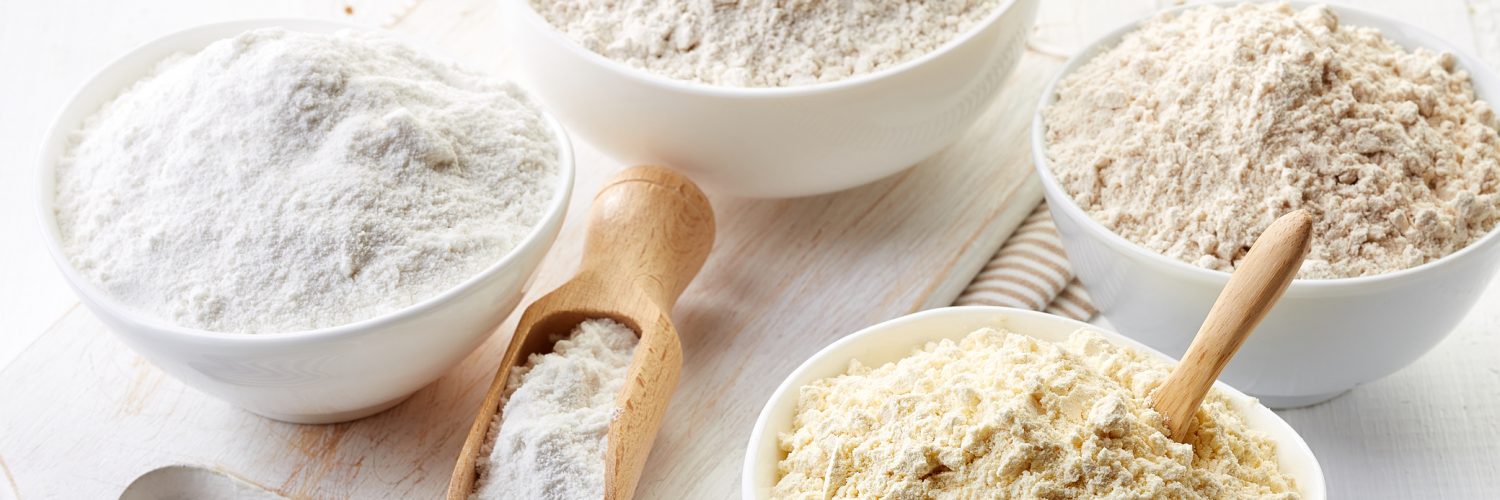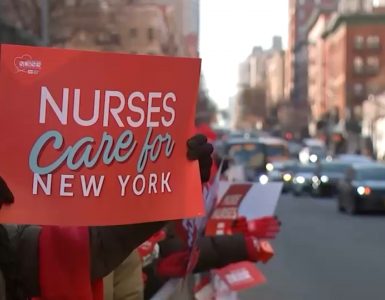Celiac disease, sometimes called celiac sprue or gluten-sensitive enteropathy, is an autoimmune disorder that renders affected individuals sensitive to gluten, a protein found in wheat, barley, and rye. People with celiac disease must adhere to a strict gluten-free diet as consumption of gluten can lead to a variety of symptoms, including diarrhea, fatigue, weight loss, bloating and gas, abdominal pain, anemia, and osteoporosis. Even those who does not suffer significant symptoms put themselves at risk of lymphoma by not keeping to the necessary diet. Even small amounts of gluten can have an ill-effect, and affected individuals must therefore avoid food that may contain even a small trace of gluten.
If a person with celiac disease consumes gluten, it elicits an autoimmune response that attacks the villi (lining) of the small intestine such that it can no longer absorb nutrients. This damage can be identified in an endoscopic examination of the intestine and the diagnosis is confirmed by biopsy. Typically, when celiac disease is suspected, a blood test for tissue Transglutaminase Antibodies (tTG-IgA) is performed; there are high serum levels of this antibody, an upper endoscopy (esophagogastroduodenoscopy) will be performed to confirm the diagnosis.
The good news is that maintaining a gluten-free diet can help the intestine recover to perfect health. But, by the same token, one who suspects he may have celiac disease may be required to eat gluten-containing foods for several months so that an endoscopic examination can effectively detect the damage to the small intestine.
This give rises to an interesting Halachic question[1]: When a person with [suspected] celiac disease is to undergo an endoscopy to confirm the diagnosis, he must be eating gluten-containing products for between three to six months before the test can be performed. During this period, when he eats foods that are [potentially] damaging to his body, should he recite a Bracha?
The Shulchan Aruch (O.C. 196:1) rules: “A person who ate a forbidden food, even if the prohibition [to eat the food] is only Rabbinic, does not make a Zimun, nor does he make a Bracha before or after eating it.”
To which foods does this apply? The Maharam Shik (O.C. 260) asserts that this applies not only to foods specifically forbidden by Halacha, but even to those that may be dangerous to one’s health. This is because the Torah states, “v’Nishmartem M’od l’Nafshosechem” (guard your health carefully), and as such, any food hazardous to one’s health is forbidden according to Torah law, and a Bracha should not be recited.
However, it is clear that the Maharam Shik refers only to food that have an immediate and quantifiable adverse effect on the body. Other foods, even those generally considered unhealthy, would not be included in the category of forbidden foods, and would not be subject to this exemption. Accordingly, if only for this ruling, one with celiac disease would recite a Bracha upon gluten-containing foods.
However, the following discussion by the Gemara in Brachos (35b-36a) may have some bearing on our question:
R’ Yehuda said in the name of Shmuel, R’ Yitzchak said in the name of R’ Yochanan: The Bracha recited over olive oil is Borei Pri ha’Eitz. When could this apply? If he drinks it, it harms him! As the Braisa says, “One who drinks Teruma oil pays the principal, but not the additional fifth. One who rubs Teruma oil [on himself] pays the principal plus a fifth…. Rather, he drank it with Anigron regarding which Raba bar Shmuel said: “Anigron is water in which beets were cooked. Ansigron is water in which any vegetable was cooked.” But if this is the case, the Anigron is the Ikar (primary food) and the oil is Tafel (secondary) and the rule is that when there is an Ikar and a Tafel, a Bracha is made on the Ikar and the Tafel is exempt. Rather, the case is where he has discomfort in his throat. As the Braisa states: “A person who has discomfort in his throat on Shabbos should not gargle oil, rather he should mix a lot of oil with Anigron and swallow the mixture.” [But if so] this ruling is obvious? No, I may have thought that since his intent [in consuming the mixture] is for healing, he should not make any Bracha at all. The Amoraim therefore teach that since one enjoys it, a Bracha must be recited.
To summarize: Shmuel and R’ Yochanan say that the Bracha to be recited on olive oil is Borei Pri ha’Eitz. The Gemara challenges this ruling because drinking olive oil is harmful to the body and thus should not require a Bracha. As proof, the Gemara cites the ruling that one does not pay the penalty of “Chomesh”[2] for drinking Teruma olive oil because consuming it is considered an act of harm, not an act of drinking. The Gemara resolves this difficulty by establishing that Shmuel and R’ Yochanan were discussing a case in which one drank oil mixed with Anigron for medicinal purposes (in this case the oil is the Ikar and the Bracha is made on it, not the Anigron). The novelty of this ruling is that although the oil is consumed for healing purposes, it still warrants a Bracha since he enjoys the taste.
There is a Machlokes Rishonim as to the explanation of the principle that one does not recite a Bracha on a food that damages the body. Rashi explains that it is predicated on the Pasuk, “V’Achalta v’Savata u’Veirachta” (Devarim 8:10)that teaches us that the Torah only requires a Bracha when one “eats”; consuming foods that endanger one’s health is not considered “eating”. Although the Pasuk refers to the Bracha Acharona, the Bracha Rishona – although only Rabbinic in nature – follows the same rules. This is in keeping with the dictum that the Rabbis instituted their laws following the rules of Torah Law.
Accordingly, in the view of Rashi, foods that damage the body warrant no Bracha at all. However, the Rambam (Hilchos Brachos 8) presents a different view:
On [olive] oil, a Bracha of Borei Pri ha’Eitz is recited. When is this? When he suffers from discomfort in his throat and drinks the oil with vegetable broth and the like because he then enjoys the taste of the drink. But if he drinks the oil by itself, or he does not suffer from a sore throat, he recites the Bracha of Shehakol because he does not enjoy the taste of the oil.
According to the Rambam when one drinks plain oil, although it is harmful to his body and he does not enjoy its taste, he nevertheless recites a Bracha of Shehakol.
The Kesef Mishna comments:
That which the Rambam writes that one who drinks olive oil alone recites a Bracha of Shehakol is very surprising. Since it is damaging to the body, no Bracha should be recited at all. This is the opinion of Rashi. The Rif also states, “And if he drinks it [alone], it damages him and no Bracha is recited.” The Tur (202) also notes that he found difficulty with the opinion of the Rambam. The Rambam must have understood that the fact that it is damaging to the body is only a reason not to recite Borei Pri ha’Eitz. However, although it harms him, since he enjoys it he should recite Shehakol.
These are the words of the Tur (cited by the Kesef Mishna): “What is written [in the Rambam] that a Bracha is said on olive oil does not seem correct. When the Gemara says, “if it drunk by itself, it is harmful to the body,” it means that no Bracha is recited whatsoever.”
The Tur concludes by stating, “The first opinion that rules that he still says a Bracha [on an olive oil-Anigron mixture] even if he doesn’t have discomfort in his throat seems more correct. Since he enjoys the taste, why should he not say a Bracha?”
In other words, there is a Machlokes Rishonim regarding one who eats food that is harmful to the body but enjoyable to the palate. Rashi holds no Bracha is recited, while the Rambam holds that a Shehakol should be recited.
The Bach notes that this dispute also relates to one who drinks vinegar as recorded by the Shulchan Aruch (O.C., 204). Rabbenu Yona states explicitly that a Bracha should be recited on vinegar even though drinking it alone is harmful to the body. The same is implied by the Rambam (Hilchos Brachos 8:8). The Tur (204), however, rules that no Bracha at all is recited on vinegar.
The Bach clarifies that the opinion of the Rambam is that Halacha distinguishes between foods that are harmful to the body but enjoyed by the palate and bitter foods that one does not enjoy eating at all. He adduces proof to this position from the Gemara (Brachos 36a) that rules that a Bracha of Shehakol is recited on oat flour. The Gemara explains that the novelty of this ruling is that although consuming oat flour is damaging to the stomach, a Bracha is still recited since one enjoys the taste.
The Rif (as cited by the Kesef Mishnah) and the Rosh (ibid. 2) rule in accordance with Rashi, while the Behag rules like the Rambam.
Does the rule that one does not recite a Bracha (or only recites Shehakol) on food that “damaging to the body,” refer only to food that is inherently harmful or even to food that is only harmful to the individual eating it due to an underlying condition?
The answer may depend upon the Machlokes between Rashi and the Rambam. According to Rashi, the reason no Bracha is said on harmful foods is because consuming them is not considered eating by Torah law. It may be compared to an Achila Gasa (forcing oneself to eat when completely full) which it is not defined as “eating” by Torah standards and therefore no Bracha is recited. This indicates that the definition of eating does not depend on the food eaten, but to the circumstances in which it is eaten. Applying this principle to our case, we would conclude that even if the food itself is generally healthy but will harm the person eating it, no Bracha should be recited since the circumstances prevent it from being classified as eating.
This principle may be used to answer a question the Acharonim ask on Rashi: The Gemara in Pesachim states (24b) that a person who drinks fruit juice is considered to be eating fruits in an “abnormal manner”. If so, according to Rashi,a Bracha should surely not be recited on drinking fruit juice given that it would not be called “eating” by Torah standards!
In light of the above, this difficulty may be resolved. Rashi only exempts a food from a Bracha when the situation dictates that it is not considered eating. Although drinking fruit juice is considered eating fruits in an unusual manner, the act of drinking itself is a regular act of drinking. As such, a Bracha is certainly warranted.
The Rambam, however, would seemingly discriminate based on the food, not the person eating it. In the view of the Rambam, damaging foods are not considered to be “important” foods, thus their Bracha is “downgraded” to a Shehakol. As such, there is no reason to take into account who is eating the food. Foods that are generally healthy will always warrant their usual Bracha, while foods that are generally harmful are always downgraded to a Shehakol.
A third explanation as to why a Bracha is not recited on harmful foods is presented by R’ Akiva Eiger (Brachos, ibid):
The explanation of this Halacha is that when a person – of his own volition – partakes of foods harmful to his body, it is not fitting that he give thanks to Hashem. The proof the Gemara adduces from Teruma foods is only to prove that drinking olive oil is harmful to the body. Rashi explains the reason one does not make a Bracha on olive oil is because the Torah says “and you will eat” regarding a Bracha. Additionally, he comments on the Braisa regarding Teruma that we see that oil is not something that can be “eaten”. This implies that the proof from Teruma is that just as consuming plain oil is not considered eating with regards to paying the additional fifth for eating Teruma, so too it is not considered eating with regards to “and you shall eat and bless”… If not for Rashi’s words I would have said that the reason one does not recite a Bracha on harmful foods is logical – it is not appropriate for a person to thank Hashem for a food that harms him! The proof from Teruma was only that oil is harmful to the body.
In other words, the basis for the exemption from reciting a Bracha on foods that are harmful is a fundamental principle, namely, that one cannot thank Hashem for foods that are harmful to his health. It is not because of any shortcoming in the food or in the act of eating.[3]
According to R’ Akiva Eiger, it would seem that one should not recite any Bracha on a harmful food, not even Shehakol. Additionally, the obligation to recite a Bracha depends not on the type of food being eaten, but rather upon whether the person eating it will be harmed by it. If it will harm the person eating, he cannot thank Hashem for making it available to him.
The Halacha is in accordance with the Rambam. Therefore, the Bracha of Shehakol is recited on any food that is harmful to the body but has a pleasant taste (see Mishna Berura, ibid.)
In our case, a person with celiac disease is required to consume gluten-containing foods in preparation for endoscopic duodenal biopsies. Should he recite a Bracha on these foods or not? In light of the above, it would seem clear that he should recite a Shehakol, but not Borei Mini Mezonos or Hamotzi since the gluten is damaging to his body. Since they are nutritious for most people, and he also derives some health benefits from them, a Shehakol should be said.
However, Rav Nissim Karelitz zt”l (Chut Shani, Brachos 202:20) rules that since when he enjoys these foods, and they only cause damage to the body after ingesting them, the regular Bracha should be recited.
The Sefer Kav
v’Naki[4]
(62) cites Rav Elyashiv zt”l who
was asked whether a diabetic who eats foods high in sugar should recite
a Bracha. Rav Elyashiv replied that he should not make a Bracha Acharona because
the quantity of food that necessitates Bracha
Acharona is a Kezayis (an olive size) and this amount would be
damaging to his health. A Bracha Rishona, however, which is said even on
a small morsel, should be said because this volume of food does not present a
danger to his health. However, Rav Aryeh Leib Shteinman zt”l ruled that
if he plans to eat a Kezayis or more, then he should also not recite a Bracha
Rishona because each piece of food he consumes contributes to harming his
body.
[1] This question was asked by Uriel Namat, a student in our Beis Medrash.
[2] Literally, a “fifth”, although this means one-quarter of the principal which is one-fifth of the total when added to the principal.
[3] R’ Akiva Eiger concedes that his explanation does not fit with Rashi.
[4] A collection of Teshuvos of Rav Elyashiv zt”l published posthumously by R’ Yitzchok Zilberstein Shlit”a












